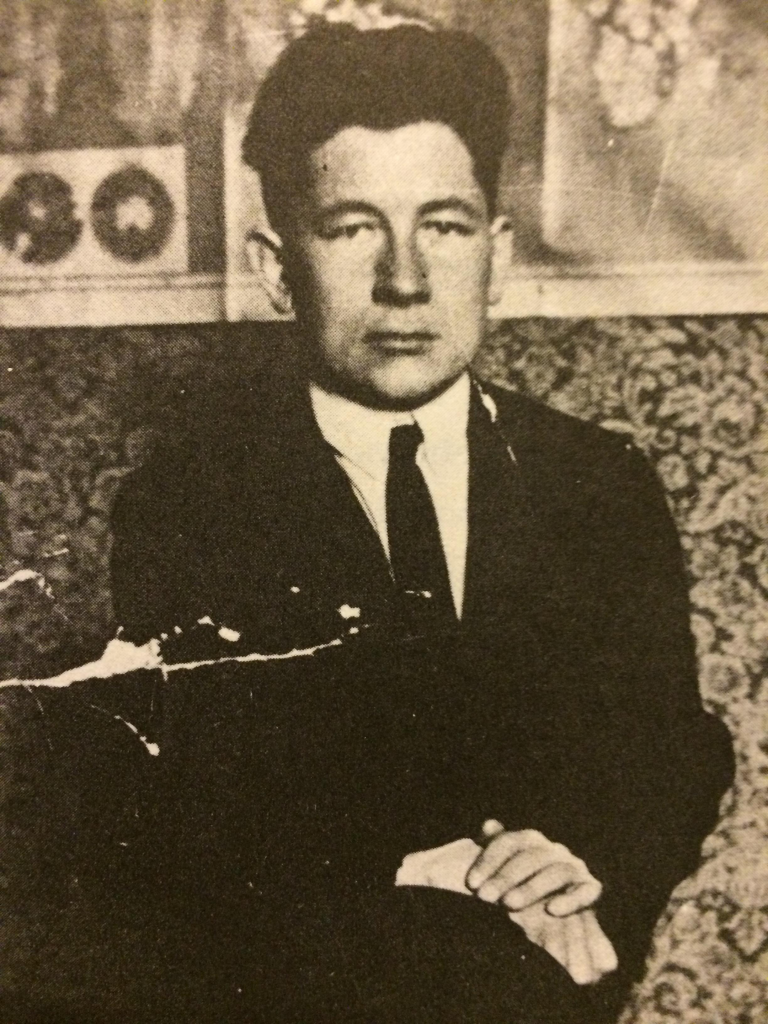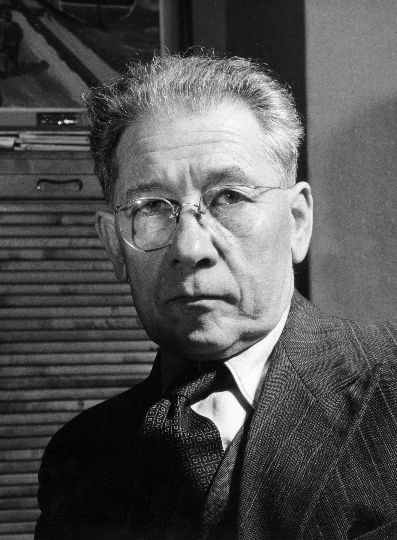Filip Volkov (Philip; Wolkoff; Volk)
Born 1881, Grodno Governorate, Russia (in present-day Belarus). Machinist. Served in Russian Army circa 1908. Migrated to US 1911. Wife and two children in Russia; she died in 1914. Joined Branch No. 1 of the Union of Russian Workers in Baltimore in 1917. Deportation warrant issued November 7, 1919, but he left Baltimore to avoid arrest; relocated to Cleveland, then returned to Baltimore after several months. Active in the Workers Red Cross/Workers Relief Society, a local organization composed largely of URW members to aid imprisoned comrades (but which federal agents mistakenly believed to be affiliated with the Communist Party). Arrested July 26, 1920. Deported February 1, 1921. Common-law wife and US-born daughter in Baltimore. Subsequent activities unknown.
INS file 54709/304; FBI file OG 370100
Issay Volkov (Иссай Волков; George; Wolkoff)
Born 1890, Kovno, Russia (present-day Kaunas, Lithuania). Painter. In Russia had belonged to the Bolshevik faction of the Russian Social Democratic Labour Party. Migrated to US 1908. 1916 joined the Union of Russian Workers branch in Waterbury, Connecticut until it dissolved in 1917; March 1919 joined the IWW local there. 1919 a member of the Union of Russian Citizens (an umbrella organization of Russian progressives). Arrested during the first Palmer Raids, November 21, 1919. Deported on the Buford. Subsequent activities unknown.
INS file 54709/171
George Voloh (Георгий Волох?)

Born 1897, Chernigov, Russia (present-day Chernihiv, Ukraine). Miner. Migrated to US 1913. Joined the Union of Russian Workers branch in Fairmont, West Virginia in 1919. Arrested December 1, 1919. Deported on the Buford. Subsequent activities unknown.
INS file 54709/589
Peter Voloshin (Петр Волошин; Pete; Woloshim)
Born 1895, Russia. Widower. Migrated to US 1914. Machinist. 1917 joined the Socialist Party, then Detroit’s Russian Branch No. 3 of the Communist Party. Arrested January 1920. Deported to Russia, February 26, 1921.
INS file 54859/695
Nikolai Volosyuk (Николай Волосук; Nicolai; Nikolaj; Volosuk; aka Mike Walker)
Born 1888, Stołpie, Russia (present-day Poland). Steelworker. Migrated to US 1914. Joined the Union of Russian Workers branch in South Bethlehem, Pennsylvania. Elected as a URW delegate to the Soviet of Workers Deputies of South Bethlehem, composed of members of the URW and local Lithuanian and Polish socialist groups, and for which he served as the recording secretary and a member of the executive committee. Arrested March 4, 1919; released on bail. Arrested again December 12, 1919. Deported on the Buford. Subsequent activities unknown.
INS file 54709/696
Carl Voss (Carl Heinrich Frederick Voss)
Born 1891, Hamburg, Germany. Sailor; laborer. Migrated to US 1910 (deserted ship). Joined the IWW 1913; 1918 became organizer for the IWW’s Metal Mine Workers’ Industrial Union No. 800. Also a member of the International Seamen’s Union. Arrested Tucson, Arizona, September 8, 1918 for failing to register for the draft; January 1919 sentenced a year in the Yavapai County Jail; reported by the sherif to have “caused him more trouble than any other prisoner he as had in jail…on account of attempting to incite riots on several occasions, and attempting to effect a jail delivery.” Arrested upon his release in January 1920 and held for deportation. Deported May 22, 1920. Subsequent activities unknown.
INS file 54860/699
See also: Harry Weinberger Papers, Yale University
Niilo Wälläri (Nillo; Nullo; Nulo)


Born 1897, Lieto, Finland. Sailor; union organizer. Migrated to US 1916 (jumped ship). Joined the IWW in 1917. Attended the Finnish IWW’s Work People’s College in Duluth, Minnesota. Became prominent Finnish-speaking IWW orator and organizer. February 1919 arrested in Erie, Pennsylvania, for allegedly crossing state lines for “immoral purposes” with his seventeen-year-old common-law wife, Lyylie (Lillian) Jaaskelainen, after she was arrested for shoplifting and IWW materials were found in his possession. The couple officially married August 20, 1920 in Pittsburgh. Niilo was deported 1920 for entering the country without inspection. The Pennsylvania Board of Appeals denied his petition to have his wife’s sentence commuted so that she could travel to Finland with him. (Lillian Wallari remained in the US and became a chiropractor.) Following his deportation, Niilo traveled to Russia where he attended political education courses conducted by the outlawed and exiled Suomen Kommunistinen Puolue (Finnish Communist Party). Returned to Finland and in February 1921 became district secretary for the Suomen Sosialistinen Työväenpuolue (Finnish Socialist Workers’ Party) in Uusimaa. May 1923 became secretary of the SKP. Arrested that August and convicted of treason. While in prison wrote in opposition to the SKP’s conception of a small revolutionary vanguard, its focus on underground organizations, and its adherence to directives from exiled leaders in Russia, and in favor of mass organizations, a popular front with social democrats, national Communist autonomy from the Comintern, and neighborhood, rather than workplace, organizations. 1926 released from prison and became editor of the Communist Työväenjärjestöjen Tiedonantaja (Labor Union Informer); 1929 he cofounded the breakaway Suomen työväen vasemmistoryhmä (Left Group of Finnish Workers). In the 1930s he advocated a united front against fascism, joined the Social Democratic Party, and continued to contribute articles to the IWW’s Finnish-language newspaper Industrialisti. 1938 became head of the militant Finnish Seamen’s Union (Suomen Merimies-Unioni), the most powerful union in the country. Under his leadership the union helped run arms to the antifascists in the Spanish Civil War, aided Jews fleeing Nazi Germany, won Finnish seamen the eight-hour day in 1946, and organized a union boycott of apartheid South Africa in the 1960s. In 1946 Wälläri was allowed to visit the US for two months as a delegate to the International Maritime Conference. After the Second World War he joined the Finnish People’s Democratic League and the ruling Socialist Unity Party (Sosialistinen Yhtenäisyyspuolue), and remained the head of the Seamen’s Union until his death in 1967.
INS file 54648/26 (file missing); FBI file OG 350179
See also: Evening News (Harrisburg PA), January 21 and 22, 1920; Pittsburgh Press, April 19, 1934; Ancestry.com; Tommi Kippola, “Transnationell syndikalism i ett lokalt rum: Industrial Workers of the World och finländarna i Duluth 1915–1921” https://www.doria.fi/handle/10024/169623; Keijo Virtanen, Settlement or Return: Finnish Emigrants (1860-1930) in the International Overseas Return Migration Movement; John H. Hodgson, Communism in Finland: A History and Interpretation (Princeton: Princeton University Press, 1967); Tauno Saarela, “American Impact on Finnish Communism in the 1920s,” in Labouring Finns: Transnational Politics in Finland, Canada, and the United States; Jukka Paastela, Finnish Communism Under Soviet Totalitarianism: Oppositions Within the Finnish Communist Party in Soviet Russia 1918-1935; Erkki Savolainen, Niilo Wälläri: legenda jo eläessään